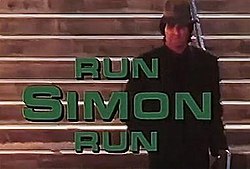| Run, Simon, Run | |
|---|---|
 Title card | |
| Written by | Lionel E. Siegel |
| Directed by | George McCowan |
| Starring | Burt Reynolds Inger Stevens Royal Dano |
| Music by | The Orphanage |
| Country of origin | United States |
| Original language | English |
| Production | |
| Producer | Aaron Spelling |
| Cinematography | Arch R. Dalzell |
| Editor | Art Seid |
| Running time | 74 minutes |
| Production company | Aaron Spelling Productions |
| Original release | |
| Network | ABC |
| Release | December 1, 1970 |
Run, Simon, Run (also known as The Tradition of Simon Zuniga) [1] is a 1970 American made-for-television thriller film from Aaron Spelling starring Burt Reynolds. [2]
Contents
It featured the last performance of Inger Stevens. [3]